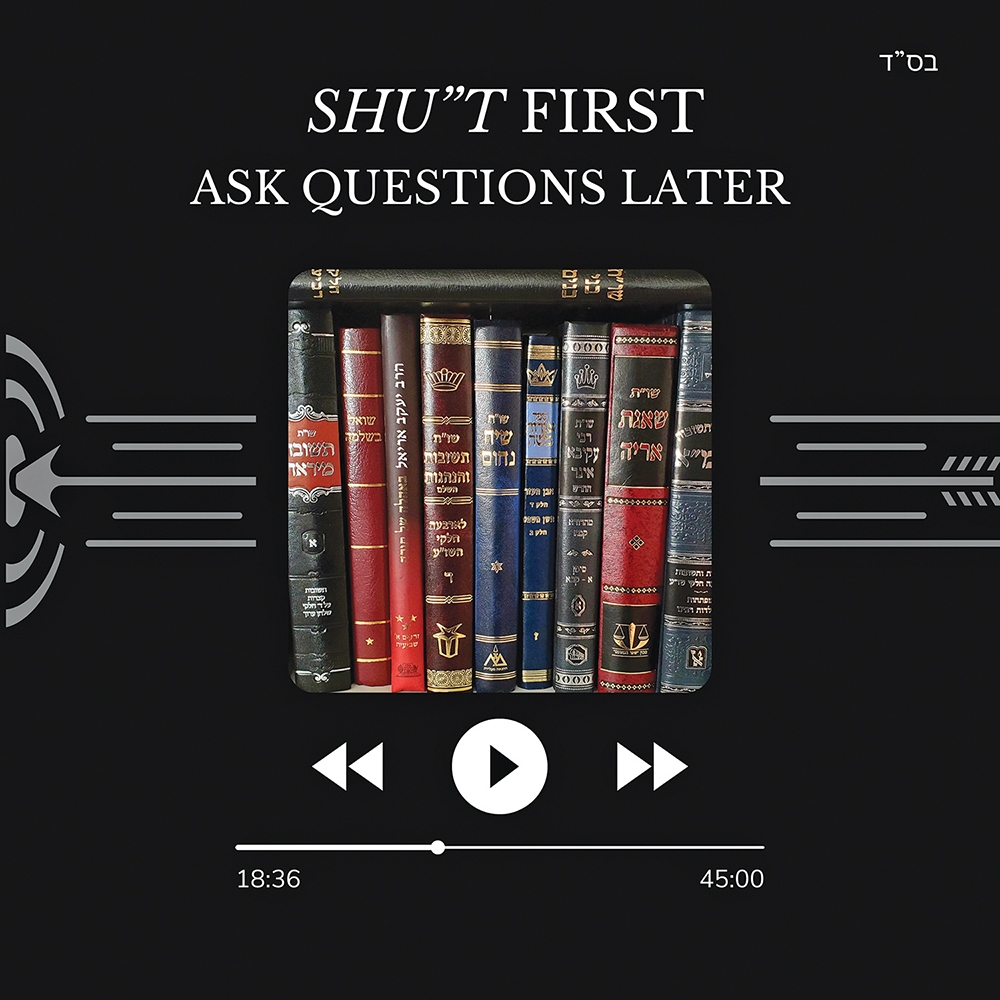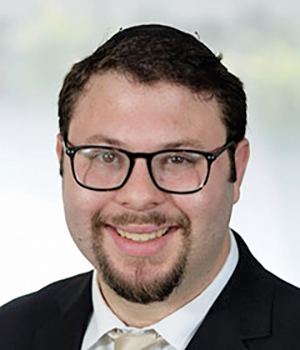
Rabbi Moshe Kurtz likes to listen to podcasts. The assistant rabbi at Congregation Agudath Sholom in Stamford sees them as a way to fulfill the mitzvah of Talmud Torah, and wanted something he could access anytime and anywhere—even when washing dishes.
Even with the wealth of Jewish-themed podcasts available, Rabbi Kurtz couldn’t find something that fit the bill. “They are mostly about Jewish personalities, not about Torah, or they are shiurim, which are mostly monologues,” he said. “There’s a dearth of podcasts in the middle ground that emphasize both. I wanted to create a podcast that offers something timeless in addition to contemporary issues.”
So, three months ago, he launched his own, synthesizing Torah Umada. Inspired by “Halacha Headlines,” hosted by Dovid Lichtenstein, and Rabbi Sam Taylor’s “Desert Island Torah,” Rabbi Kurtz launched “Shu”T First, Ask Questions Later,” a clever name suggested by a friend, with Shu”T as the abbreviation for shailos u’teshuvos—“inquiries and responsa,” a rabbinic term describing the exchange of letters from a party seeking halachic advice from a rabbi.
The most renowned contemporary example of this traditional Jewish inquiry is “Igros Moshe,” a nine-volume set containing the collected letters of Rav Moshe Feinstein, zt”l, one of the greatest and most well-respected halachic authorities of the 20th century.
“Rabbi Feinstein was far from the first to offer responsa,” Rabbi Kurtz said. “From pre-medieval times, the Jewish communities spread throughout the Diaspora would send letters to the likes of Rashi in France and Isaac Alfasi in Spain, asking for their opinions on halachic matters. Responsa literature isn’t just about halacha, but offers a window onto the broader historical context when these questions were being asked.”
Each 30-minute episode of “Shu”T First” features a guest scholar in conversation with Rabbi Kurtz on a responsum chosen by the guest, who provides relevant historical background, distills the halachic and societal considerations, offers unique methodological insights, and makes an argument for the responsum’s relevance today. Because of the historical aspect of responsa, Rabbi Kurtz hosts not only rabbis to discuss halachic literature, but also brings in historians and members of various professions to give a deeper perspective on how the responsum relates to life today.

It’s a lot to cover in a half hour, making for a rich and energetic conversation.
In late November, Rabbi Kurtz explored the question of whether Jewish courts should offer an option to appeal. He welcomed Chagai Schlesinger, an Israeli constitutional law expert and a postdoctoral visiting scholar at New York University Law School, who discussed a landmark responsum of Rabbi Ben-Zion Meir Chai Uziel and made a halachic case for appeals courts. The episode offered a counterpoint to an earlier conversation with Rabbi Yona Reiss, head of the beit din at the Chicago Rabbinical Council, who had discussed a Rashba teshuva on Dina d’malkhusa dina—how a Jew must follow the law of the land he or she resides in.
“The Rashba gives this very fiery rebuke: If we’re just going to use Dina d’malkhuta dina to upend every single law in the Torah, why do I need to study the Talmud, why do I spend all his time with the literature? We may as well just study the legal codes where we are,” Rabbi Kurtz said. “That was a discussion about the conservative nature of maintaining Jewish judicial jurisprudence, and then we contrasted it with Dr. Schlesinger’s exposition of Reb Ben-Zion Meir Chai Uziel. In Jewish law, we never really had this notion of appeals courts until now, but it could still be an authentic innovation within halachic bounds.”
While many episodes address communal or legal issues, many affect listeners on a more personal level. The most popular episode so far, based on analytics, featured Rabbi Noah Marlowe of Harvard Hillel, who discussed whether unmarried Jewish men can wear a tallit gadol.
The conversation came from Rabbi Marlowe’s personal experience as an unmarried man. (Rabbi Kurtz noted that he had his guest’s permission to share this story.) “It could feel very weird and out of place that here you are as the rabbi, and just because you happen to not be married, you’re not wearing one of the integral religious garments that one would assume a rabbi would be wearing,” Rabbi Kurtz said. Rabbi Marlowe also gave the example of a professional man in his 30s whose younger brother marries, and what it might be like to attend synagogue together: The younger brother wears a tallit, while the older brother does not. “You don’t get the respect that you deserve because a tallis has become a status symbol of adulthood for Ashkenazi men,” Rabbi Kurtz said. “And here you have someone who’s a full adult by every right but just happens not to be married. Why should I have to detract from his standing or stature in his community?” Rabbi Marlowe made a halachic argument for single adult Ashkenazi men to wear talleisim.
Rabbi Kurtz received an email from a listener who related to the situation the Hillel rabbi had described—older, not married, and not sure whether to wear a tallit. “Hearing that there was a strong halachic basis to do so vindicated him,” Rabbi Kurtz said. “He was so grateful to hear not simply an armchair discussion about the importance of the issue, but that there’s actual halachic backing for changing that practice. That took a huge weight off his shoulders.”
While “Shu”T First” came out of an intellectual interest, reaching listeners in a meaningful personal way is what makes the whole endeavor worthwhile for Rabbi Kurtz. “I didn’t set out to try to inspire anyone, so it’s very heartwarming—and it was really Rabbi Marlowe who did all the heavy lifting—but it means a lot that I could help facilitate that connection,” he said. “I hope that there are even more people out there who felt that kind of solace when they heard the episode.”
Listeners also tell Rabbi Kurtz that they’re attracted to “Shu”T First” for the bona fide Torah substance and the dynamic engagement between host and guest, that they’re getting more content than they might from a podcast on general Torah inspiration.
“My philosophy in general—and it’s not my unique philosophy—is that we believe our Torah is aytz chaim, it’s a living Torah. That doesn’t mean it’s a living document. It’s not that the principles of the Torah change over time; it’s that the scenarios that are presented to us—the technology changes, the world changes—and it’s about applying our eternal principles from God, given to us in the Torah, to new situations. I am always happy to find more ways to share Torah.”
Among listener responses, Rabbi Kurtz heard recently from a rabbinical colleague who tunes in often—even when he’s doing the dishes.
“Shu”T First, Ask Questions Later” is available on Spotify, Apple, YU Torah, and YouTube.
By Cynthia Mindell-Wong










